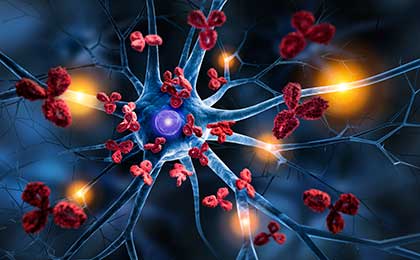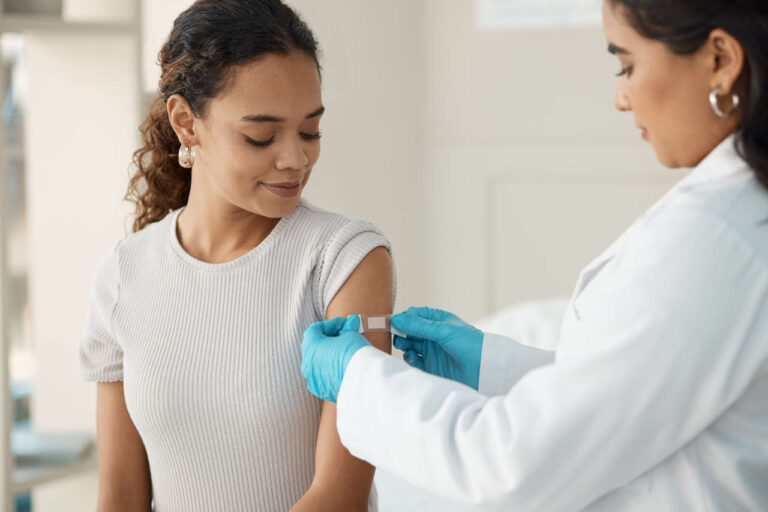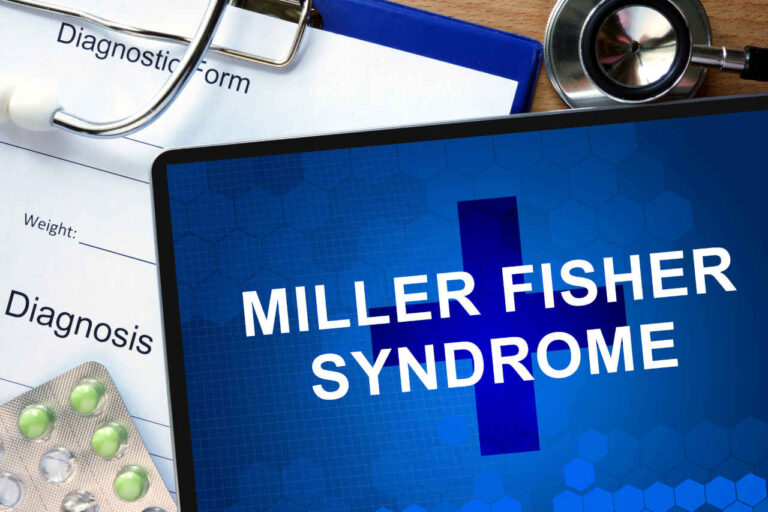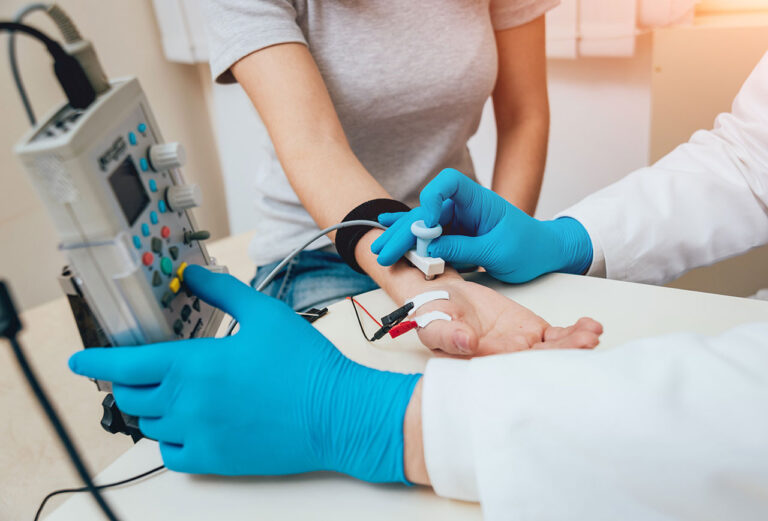
Guillain-Barre syndrome (GBS) and multiple sclerosis (MS) are both demyelinating autoimmune diseases. Though GBS and MS are both lifelong nervous system disorders with unknown causes, there are important differences between them.
GBS and MS can be distinguished based on their disease-targeted components, onset and trigger points, signs and symptoms, affected populations, treatment approaches, and more.
In this guide, we will look closer at the distinctions between Guillain-Barre vs. multiple sclerosis to give you a better understanding of both conditions.
Get IVIG Copay Assistance
Speak to a SpecialistGuillain-Barre Syndrome vs. Multiple Sclerosis: Disease-Targeted Components
In both MS and GBS, the immune system, which serves as the body’s natural defense against harmful microorganisms like bacteria and viruses, begins to abnormally attack the neurons, which are the communication cells of the nervous system.
In particular, the immune system damages or destroys the protective layer called the myelin sheath that surrounds the axons of the neurons. Myelin sheath primarily helps in rapid signal transmission from the nervous system to the rest of your body’s organs and vice versa.
Damage to the myelin sheath breaks down the communication between the neurons and ultimately leads to progressive loss of all sorts of cognitive, motor, and sensory functions.
Multiple sclerosis and Guillain-Barre syndrome seem similar, but notable differences exist that distinguish both conditions and help healthcare professionals use different treatment approaches accordingly.
Disease-Targeted Components in GBS

In Guillain-Barre syndrome, the immune system destroys the myelin sheath of the peripheral nervous system (a wide array of nerves outside the brain and spinal cord).
The immune response often targets the Schwann cells, which are important for myelin production in these peripheral nerves.
Peripheral nerves allow the brain to communicate with the rest of your body’s organs, like the heart, lungs, kidneys, muscles, etc.
Damage to these nerves disrupts signal transmission, leading to muscle weakness, numbness, or, in most cases, flaccid paralysis. One of the differences between GBS and MS is that the myelin damage in GBS is generally reversible.
Disease-Targeted Components in MS
In contrast, in the case of multiple sclerosis, the immune system damages the myelin sheath of the central nervous system (brain and spinal cord) and the cells producing myelin sheath.
The central nervous system’s myelin damage is often marked by the formation of sclerotic plaques, which disrupt the flow of electrical impulses between the brain and the body.
This process can lead to the progressive degeneration of neurons, which may exacerbate symptoms like cognitive dysfunction, spasticity, and fatigue. Since nerve damage is irreversible, it leads to impaired vision and movement disability.
Get Your IVIG Dose
At-Home InfusionGuillain-Barre Syndrome vs. Multiple Sclerosis: Affected Population and Prevalence Rate
Understanding the difference between GBS and MS is also crucial for recognizing how they affect different demographics. Let’s explore the prevalence and risk factors associated with each condition.
Risk of GBS
GBS occurs in both males and females equally. But as you age, your risk of developing GBS increases. GBS is rare and affects only 1 out of 100,000 people annually, according to the National Institute of Neurological Disorders and Stroke report.
Risk of MS
The risk of developing MS is three-fold higher in the female population than in males, with an expected age of onset between 20 and 40 years old. Approximately 2.5 million people have MS worldwide, while 400,000 cases are reported in the United States.
Can IVIG help?
Free IVIG Treatment InfoGuillain-Barre Syndrome vs. Multiple Sclerosis: Onset and Triggers Points
Although both multiple sclerosis and Guillain-Barre syndrome are neurological autoimmune disorders, they have different trigger points that can initiate symptoms and disease progression.
The Onset and Trigger Points of GBS
The onset of GBS symptoms is mainly preceded by bacterial or viral infections. Some possible triggering causes of Guillain-Barre syndrome include infections with pathogens such as Campylobacter jejuni, Haemophilus influenzae, cytomegalovirus, and SARS-Cov-2.
Other triggers may include certain vaccines, HIV or AIDS, Hodgkin’s disease, or surgery.
The Onset and Trigger Points of MS
A notable difference between GBS and MS is that MS is triggered by environmental factors, which include smoking, vitamin D deficiency, and genetic association.
Although multiple sclerosis is not directly inherited, a person may be more likely to develop MS if they have biological relatives with MS.
In other words, multiple sclerosis has a genetic risk that might be inherited. The heritability of multiple sclerosis has been estimated to be between 35% and 75%.
Furthermore, some viral infections such as Epstein-Barr virus (EBV), measles, and herpes virus-6 can also trigger the onset of multiple sclerosis. These infections cause myelin inflammation.
Guillain-Barre Syndrome vs. Multiple Sclerosis: Early Signs and Symptoms

Recognizing the early signs of multiple sclerosis and Guillain-Barre syndrome is essential for timely intervention and effective management. While they may share similar symptoms, each condition has distinct characteristics.
Symptoms of GBS
The most common and early signs of GBS are symmetric muscle weakness and tingling sensation in both legs. These sensations start from the feet and gradually move to the body’s upper part. In the worst case, it causes flaccid paralysis.
Other symptoms of GBS include:
- Decreased reflexes
- Shortness of breath
- Muscle pain or aching
- Coordination problems
- Difficulty walking or running
- Abnormal heart rate or blood pressure
- Difficulty with eye movement, facial movement, speaking, or swallowing
Symptoms of MS
Symptoms of MS typically include blurred or double vision, mobility problems, loss of balance, speech problems, cognitive and emotional disturbance, fatigue, bowel problems, depression, and sexual dysfunctions.
These symptoms typically become more aggressive over time if not caught early and treated. Without prompt care, individuals may face an increased risk of long-term complications affecting their overall quality of life and functional abilities.
Guillain-Barre Syndrome vs. Multiple Sclerosis: Diagnostic Approaches
Learning about the diagnostic differences between GBS and MS is vital for timely intervention. Accurate diagnosis often involves a combination of clinical evaluations and specialized tests tailored to each condition.
Diagnosis of GBS
Diagnosing GBS is primarily based on symptoms and a neurological examination. Healthcare providers may also employ the following diagnostic tests to confirm the condition:
- Lumbar Puncture (Spinal Tap): This test analyzes cerebrospinal fluid (CSF) for elevated protein levels with normal white blood cell count.
- Nerve Conduction Studies (NCS): This test measures how quickly electrical signals travel through the nerves, helping to identify nerve damage characteristic of GBS.
- Electromyography (EMG): This test assesses the electrical activity of muscles, revealing abnormalities in muscle response to nerve stimulation.
Diagnosis of MS
Diagnosing multiple sclerosis requires a comprehensive assessment that includes a detailed medical history and neurological examination. Various tests help to identify MS-specific changes in the central nervous system, such as:
- Magnetic Resonance Imaging (MRI): This imaging technique detects lesions in the brain and spinal cord, indicative of MS.
- Lumbar Puncture: Similar to GBS, CSF analysis can reveal oligoclonal bands, a sign of an inflammatory process in MS.
- Evoked Potentials (EPs): These tests measure the electrical activity in the brain in response to stimuli, helping to detect delays in nerve conduction.
Guillain-Barre Syndrome vs. Multiple Sclerosis: Treatment Options
There is no cure for multiple sclerosis and Guillain-Barre syndrome. However, there are treatment options that are used to manage the symptoms of each condition.
Treatments for GBS
Effective management of GBS involves a combination of treatment options tailored to the severity of the condition. These interventions aim to reduce symptoms and promote nerve healing.
The main treatment options for GBS include:
- High-Dose IVIG Treatment: IVIG therapy for GBS is used to help modulate the immune response. IVIG contains antibodies that can help block the damaging effects of the immune system on the nervous system.
- Plasma Exchange: Also known as plasmapheresis, this procedure involves the removal of plasma from the blood and replacing it with a substitute solution to help reduce the immune system’s attacks on the nervous system.
Treatments for MS
Multiple sclerosis requires a multifaceted approach aimed at managing symptoms while slowing disease progression. The treatment plan can vary depending on the type of MS and the individual’s specific symptoms.
The main treatment options for MS include:
- Steroid Medications: Corticosteroids, such as prednisone, reduce inflammation during MS relapses. These medications can help alleviate symptoms and promote recovery from acute episodes.
- Disease-Modifying Therapies (DMTs): These medications modify the course of the disease and reduce the frequency and severity of relapses. Examples of DMTs include interferon beta, glatiramer acetate, fingolimod, and dimethyl fumarate.
- Symptomatic Treatments: In addition to DMTs, various medications and therapies are available to manage specific symptoms of multiple sclerosis, such as muscle spasticity, fatigue, and bladder dysfunction.
Guillain-Barre Syndrome vs. Multiple Sclerosis: Prognosis and Long-term Outlook

Understanding the prognosis and long-term outlook for GBS and MS is crucial for patients and their families. Both conditions have distinct trajectories that can affect quality of life.
Prognosis for GBS
The prognosis for Guillain-Barre syndrome is generally favorable. A key difference between GBS and MS is that most patients with GBS experience significant improvements within weeks to months after treatment.
Up to 70% of individuals fully recover, although some may have lingering effects, such as weakness or sensory issues.
Prognosis for MS
In contrast, multiple sclerosis is a chronic condition with varying long-term outcomes. While some individuals may experience periods of remission, others may face progressive deterioration in function over time, requiring ongoing management and care.
Manage Multiple Sclerosis and Guillain-Barre Syndrome With AmeriPharma® Specialty Pharmacy
Understanding the differences between Guillain-Barre syndrome vs. multiple sclerosis can help you better manage these conditions. If you’re dealing with either MS or GBS and need specialty treatment, AmeriPharma® Specialty Pharmacy can help.
Our ACHC-accredited specialty pharmacy provides at-home IVIG infusions and hard-to-find medications for those with debilitating conditions in 40+ US states and territories.
Contact us today to speak to a specialist and receive the treatment you need with full-service coordination, copay assistance, and 24/7/365 support.












